|
Settlement of the Disbanded
Soldiers in Glengarry and Adjacent Counties of Stormont and Dundas—List of
Officers of the First and Second Battalions of the King's Royal Regiment of
New York.—Colonel Stewart's Account of the Royal Highland Emigrant Regiment
(Old Eighty-Fourth).—List of Officers.
The Revolutionary War being
over, the Highland soldiers of the various Regiments mostly settled in the
eastern part of what afterwards became the Province of Upper Canada, and
what now constitutes the County of Glengarry, being principally settled by
those from Glengarry in Scotland, they called it after the well-loved name
of the home of their forefathers; others were allotted land in what now
constitute the adjacent Counties of Stormont and Dundas. The officers and
men of the First Battalion of the Kings Royal Regiment of New York,
stationed at the close of the War at Isle aux Noix and Carleton Island, with
their wives and children, to the number of one thousand four hundred and
sixty-two, settled in a body in the first five townships west of the
boundary line of the Province of Quebec, being the present Townships of
Lancaster, Charlottenburgh, Cornwall, Osnabruck and Williamsburg; those of
the Second Battalion of the King's Royal Regiment of New York going further
west to the Bay of Quinte. The following list shows the officers of the
First Battalion of Sir John Johnson's Regiment, with length of service, &c.:
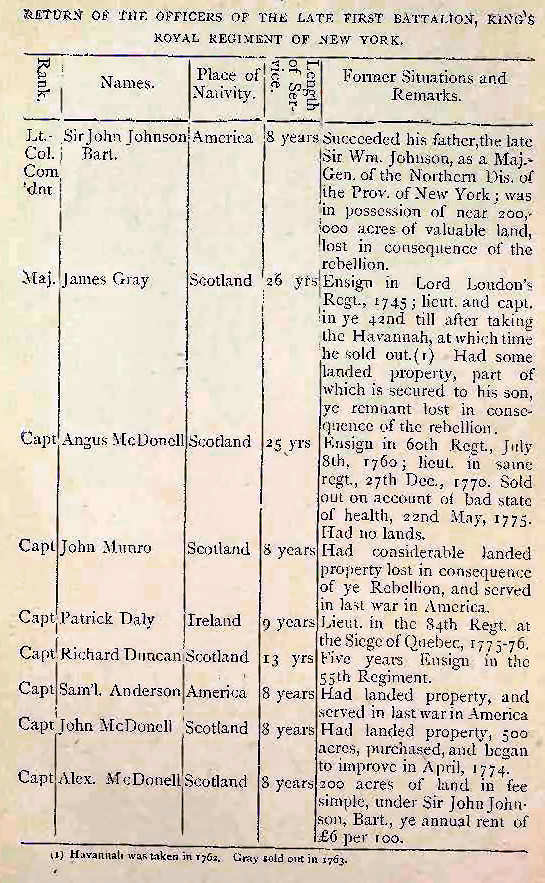
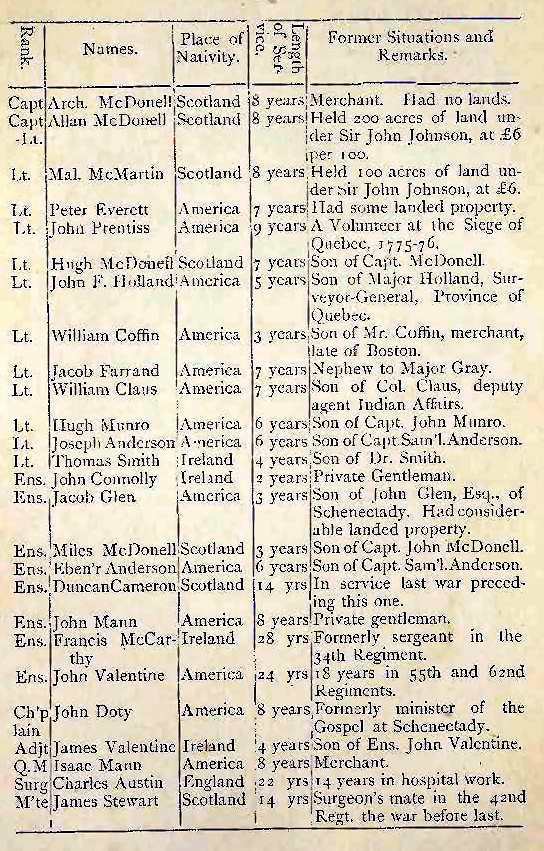
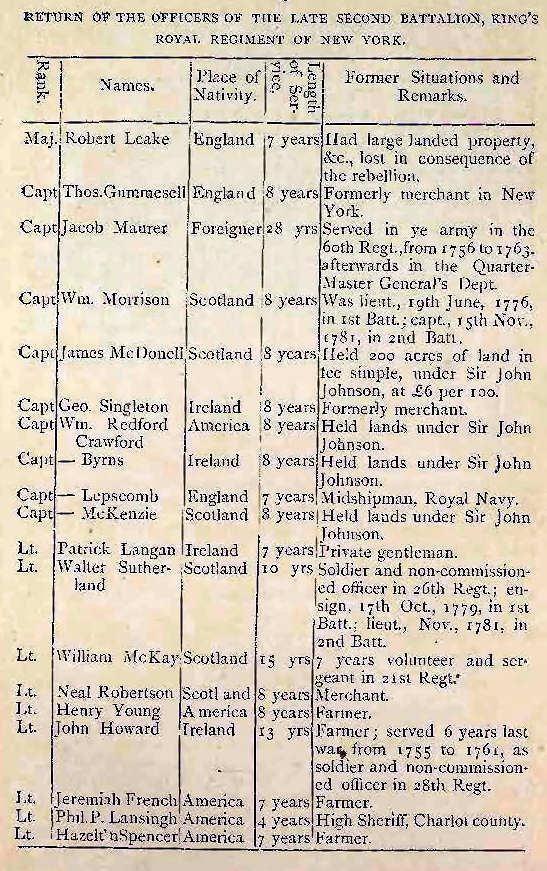
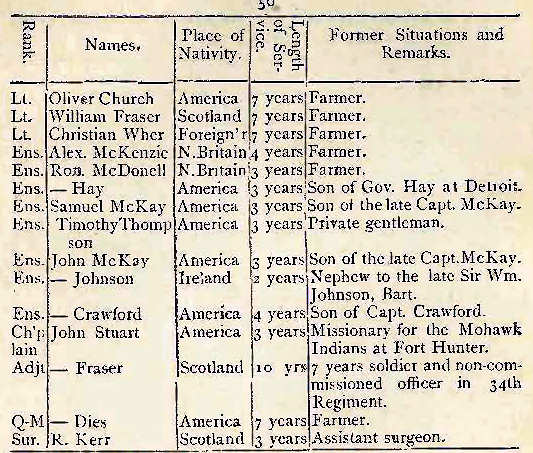
The latter Battalion, as
already stated, both officers and men, with some few exceptions, settled
principally about Cataraqui, as Kingston was then called, on the Bay of
Quinte, in the Counties of Lennox and Prince Edward, where their descendants
are now to be found. Each soldier received a certificate as follows,
entitling him to land The descendants of the soldier mentioned still
worthily occupy the land so well earned by their ancestor, lot one in the
ninth concession of Charlottenburgh:

His Majesty's Provincial
Regiment, called the King's Royal Regiment of New York, whereof Sir John
Johnson, Knight and Baronet is Lieutenant-Colonel, Commandant.
These are to certify that the
Bearer hereof, Donald McDonell, soldier in Capt. Angus McDonell's Company,
of the aforesaid Regiment, born in the Parish of Killmoneneoack, in the
County of Inverness, aged thirty-five years, has served honestly and
faithfully in the said regiment Seven Years; and in consequence of His
Majesty's Order fur Disbariding the said Regiment, he is hereby discharged,
is entitled, by His Majesty's late Order, to the Portion of Land allotted to
each soldier of His Provincial Corps, who wishes to become a Settler in this
Province. He having first received all just demands of Pay, Cloathing, &c.
from his entry into the said Regiment, to the Date of his Discharge, as
appears from his Receipt on the back hereof.
Given under my Hand and Seal
at Arms, at Montreal, this twenty-fourth Day of December, 1783.
John Johnson.
I, Donald McDonell, private
soldier, do acknowledge that I have received all my Cloathing, Pay, Arrears
of Pay, and all Demands whatsoever, from the time of my Inlisting in the
Regiment and Company mentioned on the other Side, to this present Day of my
Discharge, as witness my Hand this 24th day pf December, 1783
Donald McDonell.
Mr. Croil states that each
soldier was entitled to one hundred acres on the river front, bisides two
hundred acres at a distance remote from the River. If married and with a
family, or if at any future time he should marry, he was entitled to fifty
acres more for his wife and fifty for every child, besides which each son
and daughter on coming of age was entitled to a further grant of two hundred
acres. This, I believe, is what the men ultimately got, yet the Order in
Council of 22nd October, 1788 (although the discharge as given above, the
original of which was lent me, would seem to indicate that there had been a
previous Order on the subject) recited that on the raising of the
Eighty-fourth Regiment (Royal Highland Emigrants) the men were promised that
on their being reduced the allotment of land should be as follows: Field
Officers, 5,000 acres; Captains, 3,000; Subalterns, 2,000, Non-comrnisioned
Officers, 200, Privates, 50, and referring to the Petitions of Sir John
Johnson and Lieutenant-Colonel John Sutler, on behalf of the King's Royal
Regiment of New York and the late Corps of Rangers, directed that those
Regiments should be placed on the same footing as regards land as the
Eight)-Fourth.
Although on the termination
of the War the original settlers in Glengarry and the adjacent district
were, as we have seen, principally composed of the men of Sir John Johnson's
Regiment, yet many families of men who belonged to the 1st Battalion of the
old Eighty-fourth or Royal Highland Emigrant Regiment also settled in the
County and neighborhood, and an account of the raising and the services of
that Battalion may not be out of place. It is given in Colonel (afterwards
General) Stewart's "Sketches of the Highlanders of Scotland " which also
contains details of the military service of the Highland Regiments. This
work of the gallant Stewart of Garth, himself a soldier of high renown,
seamed all over with the scars of Egypt and Spain, is most valuable and
interesting. It is doubtful if any man except Sir Walter Scott ever did more
to gather the fragments which relate to the proud history of Scotland.
When Colonel Stewart
submitted them to Sir Walter for his perusal, and asked him to suggest a
motto for them, I have somewhere seen it stated that he mentioned these
lines from Shakespeare, which were adopted :
'Tis wonderful
That an invisible instinct should frame them
To loyalty unlearned: honour untaught;
Civility not seen from others; valour
That wildly grows in them, but yields a crop
As it it had been sowed.
Any one who doubts the entire
appropriateness of those lines had better read the book.
The Eighty-Fourth, or Royal
Highland Emigrant Regiment (originally embodied in 1775, but not regimented
or numbered till 1778), was to consist of two battalions. Lieutenant Colonel
Allan McLean, of the late One Hundred and Fourth Highland Regiment, was
appointed Lieutenant Colonel Commandant of the first battalion, which was to
be raised and embodied from the Highland Emigrants in Canada, and the
discharged men of the Forty Second, of Fraser's and of Montgomery's
Highlanders who had settled in the country after the Peace of 1763. Captain
John Small, formerly of the Forty Second and then of the Twenty First
Regiment, was appointed Major-Commandant of the Second Battalion, which was
to be completed in Nova Scotia from Emigrant and discharged Highland
soldiers. The establishment of both was Seven Hundred and Fifty men, with
officers in proportion. The Commissions were dated the 14th June, 1775.
Officers sent to the back
settlements to recruit found the discharged soldiers and emigrants loyal and
ready to serve His Majesty. The emigration from the Highlands, previous to
this period, had been very limited. With many the change of abode was
voluntary, and consequently their minds, neither irritated nor discontented,
retained their former attachment to their native country and government. But
there was much difficulty in conveying the parties who had enlisted to their
respective destinations. One of these detachments, from Caroling had to
force its way through a dangerous and narrow pass, and across a bridge
defended by cannon and a strong detachment of the rebels; but aware that the
Americans entertained a dread of the broadsword, from experience of its
effects in the last War, with more bravery than prudence, and forgetting
that they had only a few swords and fowling pieces used in, the settlements,
they determined to attack the post sword in hand and pushed forward to the
attack." But they found the enemy too strong and the difficulties
insurmountable. They were forced to relinquish the attempt with the loss of
Captain Macleod and a number of men killed. Those who escaped made their way
by different routes to their destination. Colonel Maclean's Battalion wag
stationed in Quebec, when Canada was threatened with invasion by the
American General, Arnold, at the head of three- thousand men. Colonel
Maclean, who had been detached up the River St. Lawrence, returned by forced
marches, and entered Quebec on the evening of the 13th November, 1776,
without being noticed by Arnold. He had previously crossed the river, and on
the night of the Fourteenth made a smart attack with a view of getting
possession of their outworks but was repulsed with loss, and forced to
retire to Pointe aux Trembles. The fortifications of the city had been
greatly neglected, and were now in a ruinous state. The garrison consisted
of fifty men of the Fusiliers, three hundred and fifty of Maclean's newly
Raised Emigrants and about seven hundred Militia and Seamen. General Guy
Carlton, the Commander-in-Chief, being occupied with preparations for the
general defence of the Colony, the defence of the town was entrusted to
Colonel Maclean, an able and intelligent officer.
Arnold having been reinforced
by a body of troops under General Montgomery, determined to attempt the town
by assault. On the morning of the 31st December, both Commanders, leading
separate points of attack, advanced with great boldness, but were completely
repulsed at all points, with the loss of General Montgomery killed and
General Arnold wounded. The Highland Emigrants, though so recently embodied,
contained a number of old soldiers, who, in this affair did honour to the
character of the Corps in which they served.
General Arnold, disappointed
in this attempt, established himself on the Heights of Abraham, with the
intention of intercepting all supplies, and blockading the town. In this
situation he reduced the garrison to great straits, all communication with
the country being entirely cut off. This blockade he soon turned into an
active siege; he erected batteries and made several attempts to get
possession of the Lower Town, but was foiled at every point by the vigilant
and intelligent defender, Colonel Maclean. On the approach of spring,
Arnold, despairing of success, raised the siege, and evacuated the whole of
Canada.
After this service, the
Battalion remained m the Province during the War, and was principally
employed in small but harassing enterprises. In one of these, Captain D.
Robertson, Lieutenant Hector Maclean and Ensign Grant, with the Grenadier
Company, marched twenty days through the woods with no other direction than
a compass and an Indian guide. The object to be accomplished was to surprise
and dislodge the enemy from a small post, which they occupied in the
interior. This service was accomplished without loss. By long practice in
marching through the woods the men had become very intelligent and
serviceable in this kind of warfare.
With every opportunity and
much temptation to desert, in consequence of offers of land and other
incitements held out by the Americans, it is but justice to the memory of
these brave and loyal men to state, on the most unquestionable authority,
that not one native Highlander deserted, and only one Highlander was brought
to the halberts during the time they were embodied.
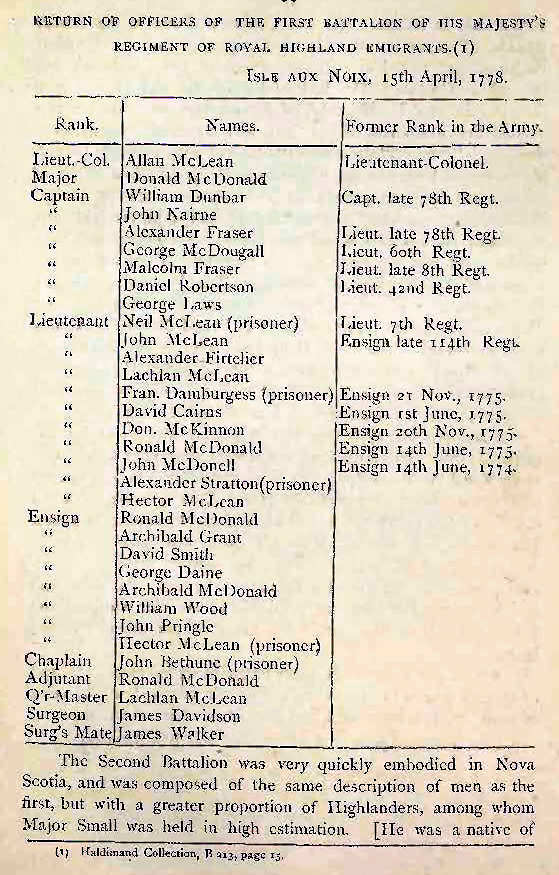
Strathardale in Athole. His
first Commission was in the Scotch Brigade. In 1747 he obtained an Ensigncy
in the old Highland Regiment, and served in it till the 'Peace of 1763, when
he was reduced as Captain. He died Major-General and Governor of Guernsey in
1796.] No chief of former days ever more firmly secured the attachment of
his Clan, and no chief, certainly, ever deserved it better. With an
enthusiastic and even romantic love of his country and countrymen, it seemed
as if the principal object of his life had been to serve them and promote
their prosperity. Equally brave in leading them in the field, and kind, just
and conciliating in quarters, they would have indeed been ungrateful if they
had regarded him otherwise than as they did. There was not an instance of
desertion in their Battalion. Five Companies remained in Nova Scotia and the
neighboring settlements during the War. The other five joined General
Clinton and Lord Cornwallis' Armies to the southward. The Flank Companies
were in the Battalion of that description. At Eataw Springs 'the Grenadier
Company was in the Battalion, which, as Colonel Alexander Stewart, of the
Third Regiment, states in his despatches, drove all before them.
It was not till 1778 that
this Regiment was numbered the Eighty-Fourth. The Battalions, which were
previously known only as the Royal Highland Emigrants, were now ordered to
be augmented to one thousand men each, Sir Henry Clinton being appointed
Colonel in Chief and the two Commandants remaining as before. The uniform
was the full Highland garb, with purses made of racoons' instead of badgers'
skins. The officers wore the broadsword and dirk, and the men a half-basket
sword. All those who had been settled in America previously to the War
remained and took possession of their lands, but many of the others returned
home.
The men of Colonel Maclean's
Battalion settled in Canada, and of Colonel Small's in Nova Scotia, where
they formed a settlement or township, as it was called, and gave it the name
of Douglas.
I am unable to procure a list
of officers of this Battalion. |
